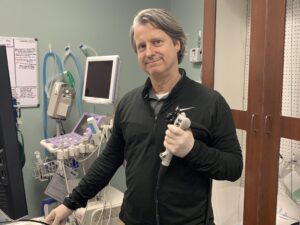If you’ve ever wondered what a veterinary specialist is, or have never even heard the term “veterinary specialist”, you are not alone. In fact, we frequently hear people say “I never knew there are veterinary specialists” and “No one ever told me there are veterinary internal medicine specialists.” We hope this blog answers all of your veterinary speciality questions.
Veterinary Specialists are Veterinarians
People often ask if Veterinary Specialists are actually veterinarians in the way that people think of “veterinarians”, or instead, if Veterinary Specialists play some other role in veterinary medicine that does not involve directly working with pets and their owners.
Veterinary specialists are often focused either on a species (e.g. exotic species), or a specific aspect of medicine (e.g. internal medicine, pathology, preventative medicine). Sometimes the focus is even more narrow, as in the case of our practice: small animal (dogs and cats) internal medicine (read more below about our practice-focus areas).
Did you know? Veterinary specialists are actual veterinarians who diagnose and treat pets just as non-specialist (general practitioner) veterinarians do.
How do you become a veterinarian?
Before delving into how to become a veterinary specialist, it’s important to know what is needed to first become a veterinarian. In the United States, the first step is to earn a 3- or 4-year undergraduate degree from an accredited college or university. Once an undergraduate degree and all pre-veterinary requirements (which includes volunteer work and experience in a veterinary setting) are completed, an application can then be submitted to an accredited college of veterinary medicine.
Did you know? There are 33 accredited Colleges of Veterinary Medicine in the United States (2023)
At the next step in the application process, some colleges perform applicant interviews with faculty, much like applying for a job. This allows the applicants to further show their experience, aptitude and dedication to complete the rigorous veterinary training. From this applicant pool, students are invited for admission to the college of veterinary medicine.
These students then begin their four-year training to become a veterinarian, finally earning either a Doctor of Veterinary Medicine (DVM) or Veterinary Medical Doctor (VMD — if graduating from the University of Pennsylvania) degree.
Did you know? There are over 4,000 first-year veterinary students enrolled in us colleges of veterinary medicine (2022-2023)
Becoming a Veterinary Specialist
During the third and fourth year of veterinary college, students begin deciding what to do after earning their veterinary degree: either begin working as a veterinarian upon graduation or pursue additional veterinary education and training through the national internship/residency programs.
Similar to the process of being accepted into a college of veterinary medicine, obtaining an internship and residency also has an application and acceptance process.
An internship is typically a 12-month training program that occurs either at a veterinary college or a large private practice specialty hospital. During the internship, lengthy hours and rigorous training in many facets of clinical veterinary medicine is performed under the supervision of experienced veterinarians, many of whom are specialists themselves and often college faculty.
At the conclusion of the internship, students then may elect to delve even deeper into a focused aspect of veterinary medicine by applying for and, if accepted, completing a 2- or 3-year residency program in their chosen focus area (in our practice, this is small animal internal medicine). During the residency, research, classroom learning and clinical training in the chosen discipline is focused on.
Did you know? There are 46 official veterinary specialties recognized by the American Veterinary Medical Association
At the conclusion of the residency, having met all requirements, individuals are then required to complete and publish veterinary research, and pass board examinations to determine if they are qualified to call themselves a veterinary specialist and attain “Diplomate” status within a college representing that discipline (e.g. American College of Veterinary Internal Medicine). A specialty “college” is not a physical building or place, it is an organization that oversees and certifies specialists in a specific discipline of veterinary medicine.
Did you know? ACVIM is the international certifying organization for veterinary specialists in cardiology, large animal internal medicine, neurology, nutrition, oncology and small animal internal medicine with over 3,000 members worldwide.
Why would you see a veterinary specialist when your pet already sees a veterinarian?
In human medicine, specialists have additional training and experience in specific areas of medicine that your primary care physician likely does not have. Your primary care physician wouldn’t perform endoscopy, imaging tests or dialysis (to name a few). For these medical needs (along with many more), you would be seen by a specialist physician with experience and training in exactly what you need. Veterinary specialists play exactly the same role for pets and work in collaboration with general practitioner veterinarians to provide additional testing and treatments for specific diseases or symptoms.
Sometimes veterinary specialists are sought out before a diagnosis is made in the case of complex, chronic and undiagnosed symptoms, when further specialized testing or experience is needed to identify the underlying cause.
What is veterinary internal medicine? What is a veterinary internist?
We’ve heard all sorts of misunderstandings about what internal medicine is and what internists do. No, an internist is not an “intern”, and yes internists diagnose and treat pets, and help clients understand their pet’s condition. However, internists diagnose and treat medical (not surgical) conditions that occur due to diseases of internal organs, blood, blood vessels, lymphatics, the immune system, endocrine (hormone) diseases, etc. Internists do not perform surgery or treat “external” diseases (e.g. skin, ears, allergies, eyes).
When should you consider seeing a veterinary internist? What diseases do internal medicine specialists diagnose and treat?
Veterinary internists diagnose and treat diseases that affect internal organs and systems (think: things that you cannot see when looking at your pet).
Diseases may be chronic, lasting weeks or months, or may be acute, occurring just for a few days. When these diseases remain undiagnosed, specialized testing may help to identify the cause. If your pet has not been feeling well for a while, a specialist may be able to provide additional answers. Testing procedures and equipment not routinely available at general practitioners is available to diagnose elusive and confusing symptoms. These tests can include advanced imaging (CT scan, MRI, ultrasound), biopsies, specialized blood testing, bone marrow sampling and endoscopy.
Internists treat diseases medically, and do not perform surgery. Medical treatment can involve IV treatments, oral therapies, blood or plasma transfusions, antidotes for poisonings, nutritional support devices (feeding tubes), therapies to improve blood clotting or reduce immune reactions, to name a few.
Organs and systems and their symptoms that we commonly diagnose and treat include:
Organs and System | Symptoms |
Nasal cavity | Sneezing, nasal discharge, nose bleeds, nasal swelling, pain, pawing at nose |
Lungs | Coughing, wheezing, difficulty catching breath, blue gums/tongue, panting, tire easily, fatigue |
Heart | Coughing, weakness, fainting, blue gums/tongue, panting, tire easily, fatigue |
Esophagus | Regurgitation, drooling, difficulty swallowing, poor appetite, pain when eating |
Stomach | Vomiting blood, unwillingness to eat, burping, licking lips, drooling, back stool (feces) |
Liver | Yellowing of eyes/skin (jaundice), confusion, tiredness, seizures, swollen abdomen, diarrhea, skin sores and crusty rash |
Gallbladder | Yellowing of eyes/skin (jaundice), abdominal discomfort, poor appetite |
Pancreas | Vomiting, diarrhea, not eating, belly pain, yellowing of eyes/skin, weight loss, hunger, thirst, acetone (nail polish) smell in breath |
Spleen | Swollen abdomen, pale (white) gums/tongue, not eating, listlessness, panting, irregular heart rhythm |
Kidneys | Ammonia smell in breath, not eating, excessive or reduced urination, vomiting, lethargy, bloody urine |
Adrenal glands | Hunger, thirst, panting, not eating, lethargy, bloated belly, losing hair, skin/ear infections |
Urinary bladder | Straining to urinate, bloody urine, urinary incontinence (leaking), frequent urination, slow urination, inability to urinate |
Prostate | Straining to urinate or defecate, inability to urinate, bloody urine, frequent urination |
Intestines | Vomiting, diarrhea, weight loss, poor appetite, black stool (feces), abdominal “noises”, belly pain |
Colon | Straining to defecate, bloody stool (feces), diarrhea, constipation |
Immune system | Pale (white) gums/tongue, skin bruising, tiredness, fever, bloody stool or urine, limping |
Circulatory system | Weakness, pale gums, fainting, unwilling to go on walks, tires easily, bleeding, bruising |
Do internal medicine specialists perform ultrasound?
The short answer is yes. But internists do so much more than that.
Ultrasound is widely available and performed by many different veterinary specialists (not just internists), as well as general practitioner veterinarians, and veterinary technicians who are trained to do so. Ultrasound is just one piece of the puzzle to understand your pet’s health.
Oftentimes results of an ultrasound study leads to other testing or treatment recommendations. Ultrasound does not treat or cure any condition, it is merely a diagnostic test among many to help diagnose your pet’s illness.
“I don’t want to offend my family veterinarian by seeking assistance from a specialist”
We hear this concern from clients frequently. All veterinarians want the best for their patients, so why would anyone be offended by you seeking additional assistance for your pet? We are glad that you are committed to your regular veterinarian, and we encourage you to continue to see them after seeking additional testing or treatments for your pet.
After we perform an ultrasound of your pet, we meet with you one-on-one to discuss the results, so that you can see pictures of internal changes, ask questions, and make informed decisions about the next testing or treatment options.
Did you know? You do not need a referral from a veterinarian to meet and consult with one of our specialists?
Your regular veterinarian assists your pet in many ways that specialists do not, so by seeing a specialist, you are not replacing them, you are simply seeking additional assistance.
If your pet has concerning symptoms, or a difficult and confusing diagnosis, and you would like to meet with and discuss these concerns with one of our specialists, simply ask your regular veterinarian for a referral, or just contact us and we will do the rest.

Author:
James Woods DVM, MS, DACVIM (SAIM)
Ph: (912) 721-6410
Contact Us
